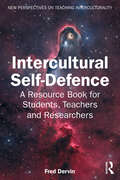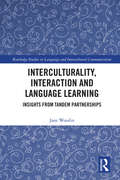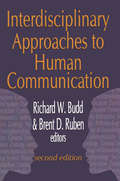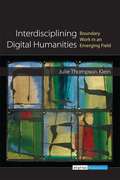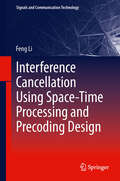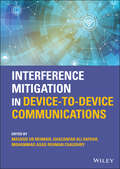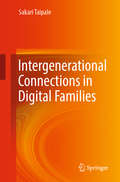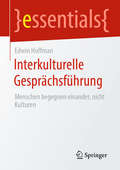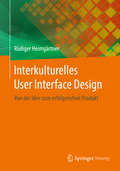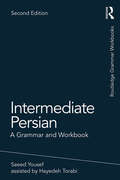- Table View
- List View
Intercultural Self-Defence: A Resource Book for Students, Teachers and Researchers (New Perspectives on Teaching Interculturality)
by Fred DervinBased on the author’s 25 years of experience in researching and teaching interculturality, Intercultural Self-Defence: A Resource Book for Students, Teachers and Researchers is a compelling exploration of the subtle forces that shape Intercultural Communication Education and Research (ICER).The Resource Book delves into the adversaries lurking within ICER - indoctrination, intellectual inertia and linguistic indifference - and unveils how they can stifle genuine understanding and growth. Each chapter acts as a critical lens, scrutinising the boundaries between education and indoctrination, the stagnation of thought and the perils of linguistic complacency. The author illustrates the impact of these forces on interculturality and the ethical implications they carry. The book contains a series of activities designed to encourage creative self-reflection and fosters a deeper understanding of the interplay between language, power and interculturality. But it is more than a resource: It is a manifesto for continuous learning, active engagement and the pursuit of a more inclusive and dynamic field of intercultural communication education and scholarship.Advocating a vigilant and self-reflexive approach, the book will serve as a critical guide for students, teachers and researchers specialising in intercultural research and education to navigate the complexities of interculturality.
Intercultural Studies in Higher Education: Policy and Practice (Intercultural Studies in Education)
by Nigel Bagnall Ana Maria de Albuquerque Moreira Jean-Jacques PaulThis book explores the study of policies and practices in Higher Education by comparing systems, institutions, programs, innovations, results and cultures. In a rapidly changing global and international marketplace, the growth of higher education has occurred within distinct cultural contexts, meaning that change is reflected within local, regional, national and global perspectives. Using a single data methodology across countries and continents, the editors and contributors explore higher education reforms between global and local dimensions, the expansion of access and democratisation, and relevant aspects in the organisation and management of higher education. In doing so, this book arrives at an understanding of higher education at a truly intercultural level, which can lead to a deeper and more holistic understanding of policies and practices in higher education. This innovative book will be of interest and value to students and scholars of higher education across the world as well as the study of interculturality.
Interculturality and the English Language Classroom
by Mabel Victoria Chittima SangiamchitThis book examines the concept of interculturality in English Language Teaching (ELT), using examples from diverse international and educational settings to demonstrate different approaches. Increased contact between multilingual speakers from different cultural backgrounds means that linguistic and intercultural competence must be taught hand in hand, and the approaches featured here will: encourage learners to develop intercultural sensitivity and a critical intercultural attitude; mitigate the limitations of textbooks and extend the learning to global issues, intercultural citizenship, and media literacy; show the potential of telecollaboration and popular culture as pedagogical resources; and demonstrate the value of interculturality in English as lingua franca situations and English for Academic Purposes. The chapters feature empirical studies from around the world, and include questions for reflection and recommended reading so that readers can engage more closely with key concepts, compare and adapt the practices most relevant to them. This book contributes to the literature on (inter)cultural pedagogy, English as a lingua franca, language pedagogy, and teacher professional development, and will be an invaluable tool for English language teachers, teacher trainers and educators seeking to enrich their practice. It will also be of interest to students and scholars of Applied Linguistics, especially language education.
Interculturality in Learning Mandarin Chinese in British Universities (Routledge Chinese Language Pedagogy)
by Tinghe JinAs China and Chinese language learning moves centre stage economically and politically, questions of interculturality assume even greater significance. In this book interculturality draws attention to the processes involved in people engaging and exchanging with each other across languages, nationalities and ethnicities. The study, which adopts an ecological perspective, critically examines a range of issues and uses a variety of sources to conduct a multifaceted investigation. Data gathered from interviews with students of Mandarin sit alongside a critical discussion of a wide range of sources. Interculturality in Learning Mandarin Chinese in British Universities will be of interest to students and academics studying and researching Chinese language education, and academics working in the fields of language and intercultural communication, intercultural education and language education in general.
Interculturality, Interaction and Language Learning: Insights from Tandem Partnerships (Routledge Studies in Language and Intercultural Communication)
by Jane WoodinThis book opens up new lines of debate in language learning and intercultural communication through an investigation of tandem language learning (a method of language learning based on mutual language exchange between native speakers and learners of each other’s language) in connection with intercultural learning and identity construction. Through an empirical study of face-to-face tandem conversations, Jane Woodin provides compelling evidence for the re-definition of the tandem partnership beyond the traditional native speaker–non-native speaker (NS-NNS) paradigm. By analyzing conversation shapes, learner identification of self and other and interactants’ own focus on culture, this book reveals how interactants themselves address the complexities of language, learning, ownership and meaning. The book also questions the prevalence of models of intercultural competence which describe the competence of the individual, with little recognition of the role of the relationship or interaction. Woodin considers the broader applicability of the tandem framework of autonomy and reciprocity, and suggests new directions for further research on tandem learning.
Interdisciplinary Approaches to Human Communication
by Richard W. BuddThis volume brings together diverse and divergent essays on communication as viewed by outstanding scholars in various disciplines. The authors review the mainstream of each approach to communication, sketch the dimensions of that concern, and discuss the problems and potential for future progress.Contents: Lee Thayer, "Communication: Sine Qua Non of the Behavioral Sciences"; Hubert Frings, "Zoology"; Alfred G. Smith, "Anthropology"; Richard W. Budd, "General Semantics"; Brent D. Ruben, "General System Theory"; Joseph M.R. Del-gado, "Neurophysiology"; Herbert Blumer, "Symbolic Interaction"; and Peter L. Berger, "Sociology of Knowledge."
Interdisciplinary Research for Printing and Packaging (Lecture Notes in Electrical Engineering #896)
by Min Xu Li Yang Pengfei Zhao Zhuangzhi Ye Shu Yan Linghao ZhangThis book includes original, peer-reviewed research papers from the 12th China Academic Conference on Printing and Packaging (CACPP 2021), held in Beijing, China on November 12-14, 2021. The proceedings cover the recent findings in color science and technology, image processing technology, digital media technology, mechanical and electronic engineering and numerical control, materials and detection, digital process management technology in printing and packaging, and other technologies. As such, the book is of interest to university researchers, R&D engineers and graduate students in the field of graphic arts, packaging, color science, image science, material science, computer science, digital media, network technology, and smart manufacturing technology.
Interdisciplinary Technological Advancements in Smart Cities (EAI/Springer Innovations in Communication and Computing)
by Cristina Costa Arij Naser Abougreen Shilpa MehtaThis book explores interdisciplinary technological advancements in smart cities. The book begins with a comprehensive study of smart cities, followed by their benefits and shortcomings. The authors show how, with the help of digital technology, cities are becoming more sustainable and efficient, leading to a better quality of life. The book includes a comprehensive review of literature, research works, and case studies, which are presented to demonstrate how various technologies can be integrated into smart cities. The book includes scenarios in smart agriculture, smart transportation, smart healthcare and more. This book also offers researchers, students, academicians, and professionals working in this field an extensive range of smart city applications.
Interdisciplining Digital Humanities: Boundary Work In An Emerging Field
by Julie Thompson KleinInterdisciplining Digital Humanities sorts through definitions and patterns of practice over roughly sixty-five years of work, providing an overview for specialists and a general audience alike. It is the only book that tests the widespread claim that Digital Humanities is interdisciplinary. By examining the boundary work of constructing, expanding, and sustaining a new field, it depicts both the ways this new field is being situated within individual domains and dynamic cross-fertilizations that are fostering new relationships across academic boundaries. It also accounts for digital reinvigorations of "public humanities" in cultural heritage institutions of museums, archives, libraries, and community forums.
Interface-Driven Phenomena in Spanish: Essays in Honor of Javier Gutiérrez-Rexach (Routledge Studies in Hispanic and Lusophone Linguistics)
by Sandro Sessarego Melvin González-RiveraInterface-Driven Phenomena in Spanish: Essays in Honor of Javier Gutiérrez-Rexach brings together a collection of articles from leading experts in the fields of formal syntax and semantics. With a specific focus on interface-related phenomena, the articles address a broad array of issues in Spanish grammar. In so doing, the book offers an updated view on current research topics while providing a rich variety of methods and theoretical perspectives. The volume will be of interest to advanced students, researchers and scholars working on Spanish syntax, semantics and their interfaces.
Interference Cancellation Using Space-Time Processing and Precoding Design
by Feng LiInterference Cancellation Using Space-Time Processing and Precoding Design introduces original design methods to achieve interference cancellation, low-complexity decoding and full diversity for a series of multi-user systems. In multi-user environments, co-channel interference will diminish the performance of wireless communications systems. In this book, we investigate how to design robust space-time codes and pre-coders to suppress the co-channel interference when multiple antennas are available. This book offers a valuable reference work for graduate students, academic researchers and engineers who are interested in interference cancellation in wireless communications. Rigorous performance analysis and various simulation illustrations are included for each design method. Dr. Feng Li is a scientific researcher at Cornell University.
Interference Mitigation in Device-to-Device Communications
by Masood Ur Rehman Ghazanfar Ali Safdar Mohammad Asad Rehman ChaudhryExplore this insightful foundational resource for academics and industry professionals dealing with the move toward intelligent devices and networks Interference Mitigation in Device-to-Device Communications delivers a thorough discussion of device-to-device (D2D) and machine-to-machine (M2M) communications as solutions to the proliferation of ever more data hungry devices being attached to wireless networks. The book explores the use of D2D and M2M technologies as a key enabling component of 5G networks. It brings together a multidisciplinary team of contributors in fields like wireless communications, signal processing, and antenna design. The distinguished editors have compiled a collection of resources that practically and accessibly address issues in the development, integration, and enhancement of D2D systems to create an interference-free network. This book explores the complications posed by the restriction of device form-factors and the co-location of several electronic components in a small space, as well as the proximity of legacy systems operating in similar frequency bands. Readers will also benefit from the inclusion of: A thorough introduction to device-to-device communication, including its history and development over the last decade, network architecture, standardization issues, and regulatory and licensing hurdles An exploration of interference mitigation in device-to-device communication underlaying LTE-A networks A rethinking of device-to-device interference mitigation, including discussions of the challenges posed by the proliferation of devices An analysis of user pairing for energy efficient device-to-device content disseminationPerfect for researchers, academics, and industry professionals working on 5G networks, Interference Mitigation in Device-to-Device Communications will also earn a place in the libraries of undergraduate, graduate, and PhD students conducting research into wireless communications and applications, as well as policy makers and communications industry regulators.
Interfirm Relationships and Trade Credit in Japan
by Souichirou Kozuka Hirofumi Uchida Arito Ono Makoto Hazama Iichiro UesugiThis is the first book to report the details of the current status of interfirm relationships in Japan. Based on a unique data set of firms, the authors describe the characteristics of interfirm transactions in a manner unprecedented in the literature. Special emphasis is placed on the nature of payment/collection between firms. Payment for interfirm transactions is usually made on account, or by payment after delivery, rather than by immediate payment. Thus, most interfirm transactions are accompanied by a provision of credit (i. e. , lending/borrowing) from a seller to a buyer, referred to as trade credit. Although trade credit is used all around the world and accounts for a large portion of firms' balance sheets, researchers, lacking detailed data, have long encountered serious difficulty in clarifying how and why firms use trade credit. In this work the authors use a huge, unique data set of about 380,000 firms in Japan during the 2007-2010 period. To grasp the entirety of this enormous data set, which is tantamount to a picture of all firms currently operating in Japan, this brief summarizes descriptive statistics and conducts univariate analyses of the data. Also provided is the legal background of trade credit practice in Japan from the "law and economics" perspective. In this manner, the book furnishes vital information that can be used as a reference for future theoretical and empirical analyses of trade credit and interfirm relationships.
Intergenerational Communication Across the Life Span (Routledge Communication Series)
by Jon F. Nussbaum Angie WilliamsIndividuals of all ages interact with one another, and their interactions have significance throughout their lives. This distinctive volume acknowledges the importance of these interactions and provides a life-span developmental view of communication and aging, attempting to capture the many similarities and changes that occur in people's lives as they age. The authors move the study of intergenerational contact closer to the actual participants, examining what happens within intergenerational interactions and how people evaluate their intergenerational experiences. The volume concentrates on the micro-context of the intergenerational interaction and the cognitions, language, and relationship behaviors related to intergenerational communication across the life span. The volume employs the perspective that the understanding of human behavior across the life span is enhanced by studying communicative behavior in intergenerational interaction. The authors integrate research from multiple disciplines concerned with intergenerational communication, which is framed by several unique theoretical perspectives drawn from the communication discipline. As a resource for the study of intergenerational communication across the life span, this monograph offers important insights to scholars, students, and all who are involved in intergenerational communication.
Intergenerational Connections in Digital Families
by Sakari TaipaleThis book provides a comprehensive review of how digital communication technology can help families network and communicate across generations, despite differences in family composition, residential location, cultural values and orientations. Covering the full spectrum of intergenerational relations (including child to parent, and parent to grandparent), it offers a positive view of the value of digital technology usage within families.The author focuses on three European countries: Finland, Italy and Slovenia, but also touches on other European countries and parts of the United States, revealing evidence that challenges ideas of universal adoption of information communication technology (ICT) and consistency in the social effects of such adoption in different regions and cultures. Further, the book discusses numerous other challenges and issues, such as:• the social transformations and technological developments that have made digital families possible;• the resulting changes in family roles, responsibilities, and practices; and• the theoretical and conceptual implications of digital communication-technology use in families.The author illustrates how ICT can facilitate family solidarity and how it helps to provide new ways of being together, and they discuss how social media, particularly instant messaging applications, helps develop affinity between family members better than traditional one-to-one personal communication tools. Combining highly nuanced material with fresh sociological thinking, it enhances readers’ theoretical understanding of the meaning of the ‘digital family’, making it a powerful resource for graduate and undergraduate students, as well as academics. Thanks to its structured format with easy-to-understand explanations, it appeals to practitioners and researchers alike.
Interkulturelle Gesprächsführung: Menschen begegnen einander, nicht Kulturen (essentials)
by Edwin HoffmanWir alle kommen mit der Superdiversität der Gesellschaft in Kontakt, die zeigt, wie geschichtet, kontextabhängig und veränderlich sich Menschen sozial organisieren und identifizieren. Kulturelle Identität ist schon lange nicht mehr nur mit der nationalen Herkunft identisch, Autochthone und Migranten aus zahlreichen Herkunftsländern haben jeweils ihre eigene Vielfalt an Bevölkerungsgruppen und sozialen Kategorien. Was bedeutet diese Superdiversität für die professionelle Kommunikation? Edwin Hoffman bietet in diesem essential mit vielen Beispielen einen innovativen Ansatz, der auf zwischenmenschlicher Kommunikation und nicht auf der Begegnung von Kulturen basiert. Das TOPOI-Modell enthält Handlungsstrategien zur Reflexion und Überbrückung von Kommunikationsunterschieden.
Interkulturelle Kompetenz online vermitteln (Key Competences for Higher Education and Employability)
by Gundula Gwenn Hiller Ulrike Zillmer-Tantan Reema FattohiBei interkulturellen Trainings geht es um den Erwerb des kommunikativen Handlungswissens sowie die Arbeit an der inneren Haltung. Voraussetzungen dafür sind eine vertrauensvolle Atmosphäre und Interaktion. Wie lässt sich das online umsetzen? Dieses Buch liefert darauf Antworten, in 3 Teilen:• Theoretische Grundlagen vermitteln didaktische Prinzipen • Praxisberichte inspirieren zur Umsetzung innovativer Lehr-Lernkonzepte, und • Eine praxiserprobte Methoden-Sammlung von über 50 Trainer*innen liefert eine breite Auswahl an Tools für interkulturelles Lernen. Trainer*innen und Lehrende finden hier solides handwerkliches Wissen mit konkreten Umsetzungstipps.
Interkulturelle Wirtschaftspsychologie (Springer-Lehrbuch)
by Petia GenkovaDieses Lehrbuch befasst sich mit den kulturellen Unterschieden in der Wirtschaftspsychologie. Im Mittelpunkt steht die Wechselwirkung zwischen Kultur und ihrem Einfluss auf Denken und Verhalten im wirtschaftlichen Kontext. Mit Lernzielen, Praxistipps, Definitionen, Verständnisfragen und Zusammenfassungen ist dieses Werk didaktisch klar strukturiert und leicht verständlich aufgebaut. Eindrücklich zeigt es auf, welche Phänomene eher universell, d.h. in allen Kulturen gültig sind, und welche der affektiven, kognitiven und verhaltensbezogenen Phänomene eher kulturspezifischen Regeln und Normen unterliegen. Zum besseren Verständnis sind die Zusammenhänge praxisnah mit Fallbeispielen veranschaulicht. Aktuelle Studien runden die wissenschaftlichen Grundlagen mit interessanten Erkenntnissen und Beispielen ab. Direkte Handlungsimplikationen regen zum Nachdenken an und laden zur praktischen Umsetzung ein.
Interkulturelles User Interface Design
by Rüdiger HeimgärtnerDieses Fachbuch beschreibt den Weg der Entwicklung eines international nutzbaren Produktes mit Mensch-Maschine-Schnittstelle von der Theorie über die Konzeption und Gestaltung bis hin zur praktischen Umsetzung. Es werden die wichtigsten Konzepte in den Bereichen Philosophie, Kommunikation, Kultur und Ethnocomputing als Grundlage des interkulturellen User Interface Designs erläutert. Der Autor präsentiert direkt nutzbares handlungsrelevantes Wissen für die Prozesse der Internationalisierung und Lokalisierung von Software. Das Werk ist für ein allgemeines Publikum geschrieben, das sich für Softwareergonomie, Softwareengineering und das menschzentrierte Design im interkulturellen Kontext interessiert. Für Produktmanager und Usability Professionals sind die konkreten Empfehlungen und Checklisten für die direkte Umsetzung in der Produktgestaltung von besonderem Interesse.
Intermediate Dutch: A Grammar and Workbook (Grammar Workbooks)
by Jenneke A. OosterhoffIntermediate Dutch is designed for learners who have achieved a basic proficiency and wish to refine their knowledge of grammatical structures. This Workbook, along with its companion volume Basic Dutch, provides clear and concise summaries of the essential points of Dutch grammar as well as opportunities to practice using the structures of the language. Building on the lessons of Basic Dutch, each of the twenty-four units presents a grammatical topic with an introduction and overview, followed by contextualized exercises to reinforce learning. Features include: a clear accessible format many useful language examples abundant exercises with a full answer key frequent references to English grammar an appendix on irregular verbs an index of grammatical keywords. Suitable for independent learners and students on taught courses, Intermediate Dutch, together with its sister volume Basic Dutch, forms a structured course in the essentials of Dutch grammar.
Intermediate German: A Grammar and Workbook (Grammar Workbooks)
by Heiner Schenke Anna MiellIntermediate German: A Grammar and Workbook is designed for learners who have achieved basic proficiency and now wish to progress to more complex language. Each of the units combines concise grammar explanations with examples and exercises to help build confidence and fluency. The new edition includes: up-to-date cultural aspects of German-speaking countries extended entries on adverbs and the imperative Did you know? sections with tips on learning strategies, and on contemporary usage more exercises to refine retention Suitable for students learning with or without a teacher, Intermediate German forms a structured course of the essentials of German grammar and is suitable for students at intermediate level, corresponding to levels A2–B1+ on the CEFR or Intermediate High/Advanced Low with the ACTFL.
Intermediate Korean: A Grammar and Workbook (Grammar Workbooks)
by Andrew Sangpil ByonIntermediate Korean: A Grammar and Workbook comprises an accessible reference grammar and related exercises in a single volume. This workbook presents twenty-four individual grammar points, covering the core material which students would expect to encounter in their second year of learning Korean. Grammar points are followed by examples and exercises which allow students to reinforce and consolidate their learning. Intermediate Korean is suitable for both class use as well as independent study. Key features include: clear, accessible format many useful language examples all Korean entries presented in Hangul with English translations jargon-free explanations of grammar abundant exercises with full answer key subject index. Clearly presented and user-friendly, Intermediate Korean provides readers with the essential tools to express themselves in a wide variety of situations, making it an ideal grammar reference and practice resource for students with some knowledge of the language.
Intermediate Korean: A Grammar and Workbook (Routledge Grammar Workbooks)
by Andrew Sangpil ByonThis revised second edition of Intermediate Korean: A Grammar and Workbook is an accessible reference grammar and related exercises in a single volume. The text can be used in conjunction with any primary textbook, both as a reference guide to the intermediate Korean grammar and a practice book to reinforce learning. This book presents 24 individual grammar points, covering the core material that students would expect to encounter in their second year of learning Korean. Grammar points are followed by examples and exercises which allow students to reinforce and consolidate their learning. Key features include: Clear, accessible format Many useful language examples All Korean entries presented in Hangul with English translations Abundant exercises with full answer key Subject index. Clearly presented and user-friendly, Intermediate Korean provides readers with the essential tools to express themselves in a wide variety of situations, making it an ideal grammar reference and practice resource for students with some knowledge of the language. Intermediate Korean is suitable for both class use as well as independent study.
Intermediate Market Leader Business English Course Book
by David Cotton David Falvey Simon KentThis five-level course uses authoritative, authentic sources to explore topical business issues and builds the professional standard of language needed to communicate in the modern world of business.
Intermediate Persian: A Grammar and Workbook (Routledge Grammar Workbooks)
by Saeed Yousef Hayedeh TorabiIntermediate Persian: A Grammar and Workbook comprises accessible grammar exercises in a single volume. Each of the 14 units deals with a particular grammatical point and provides associated exercises to help learners reinforce and consolidate their knowledge. In addition, it features four appendices, covering colloquial, polite, literary and journalistic styles. Intermediate Persian reviews the principles presented in Basic Persian and introduces more-advanced features and structures of the language. User-friendly and engaging, Intermediate Persian is suitable for both class use and independent study. This edition is completely revised with additional features, such as a review chapter and translations of all the examples.
